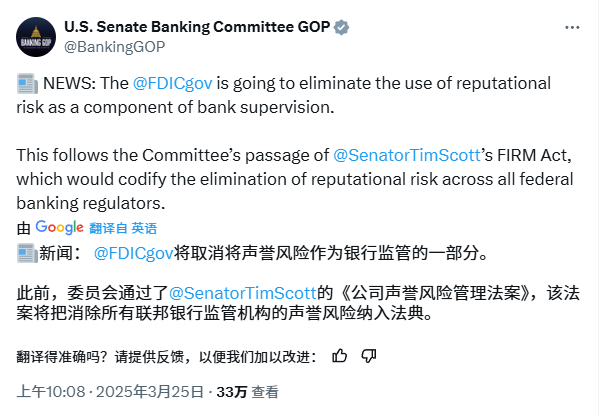
In the United States, the cryptocurrency industry has always been like standing on the edge of the financial world, yearning for mainstream recognition but often blocked by an invisible wall. The name of this wall is "reputation risk". For years, U.S. banks have been cautious when dealing with crypto companies, afraid of crossing the regulatory red lines. However, recently, the official account of the Republican side of the U.S. Senate Banking Committee: the Federal Deposit Insurance Corporation (FDIC) may follow the Office of the Comptroller of the Currency (OCC) in removing "reputation risk" as a consideration for bank regulation. This was called a "huge victory for the crypto industry" by David Sacks, the crypto and AI mogul. So, what exactly is this about? What changes will it bring to the cryptocurrency industry? What does it mean for industry practitioners?
One: Reputation Risk - The 'Shackle' Between Banks and Crypto
To understand the significance of this matter, we first need to discuss what "reputation risk" is. Simply put, reputation risk refers to the risk that a bank might damage its own reputation due to certain businesses or behaviors. For example, if a bank is associated with a highly controversial industry, customers might leave, public opinion might escalate, and lawsuits might even follow. This risk sounds reasonable - after all, who doesn't want to maintain a good reputation? But in practice, this standard becomes blurry and subjective.
U.S. regulators once defined reputation risk as: "Negative publicity about an institution's business practices (true or false) that could lead to customer loss, litigation, or revenue decline." You see, this definition is as broad as a basket, where anything can be thrown in. As a result, regulators use this basket to point fingers at bank operations. Especially in the cryptocurrency industry, reputation risk has become an invisible "shackle". Many banks fear that cooperating with crypto companies might make regulators see them as "risky", so they simply close their doors and won't even open accounts.
For example, even big-name crypto companies like Coinbase have openly complained about how difficult it is to find a cooperative bank in the United States. Sometimes, they even have to go overseas to open accounts. This phenomenon has an unflattering name in the industry - "Operation Chokepoint 2.0", meaning strangling the crypto industry's neck through financial regulation.
Two: Policy Relaxation - A New Dawn for the Crypto Industry?
Just as the crypto industry was struggling, things began to change. The Federal Deposit Insurance Corporation (FDIC) will follow the Office of the Comptroller of the Currency (OCC) in removing 'reputation risk' as a factor in bank regulation. If this becomes a reality, it means that in the past, banks refused crypto companies largely because they were afraid of regulatory trouble. Now, with this "trouble" gone, banks can more confidently cooperate with crypto companies. Imagine if you were a crypto company owner, previously running around unable to find a bank willing to open an account, and now the situation has changed - wouldn't you be able to breathe a sigh of relief and focus on your business instead of begging everyone?
More importantly, this is not a small move by a single institution, but a signal of the U.S. financial regulatory trend. U.S. Senator Tim Scott has even proposed a bill called the Financial Institution Risk Management Act (FIRM Act), which aims to completely limit regulators from using reputation risk to pressure banks. This series of actions makes people feel that the U.S. government might be shifting from "over-regulation" to "giving some space", acknowledging the crypto industry as a legitimate economic domain.
Three: Industry Perspective - Calm Reflection Beyond Cheers
Bitwise's CEO said in an interview: "This is great for us, cooperation with banks will be easier, and operational costs can be reduced." Many practitioners feel that with the "reputation risk" hurdle gone, crypto companies can finally catch their breath and focus on innovation and market competition.
But cheers aside, not everyone thinks everything is perfect. Aiying believes that banks' willingness to cooperate depends not only on regulatory policies but also on their own compliance and anti-money laundering risk control capabilities. Most enterprises are still weak in this area, or weakness is instinctive, as being strong would mean losing many business opportunities. So banks' hesitation to get involved with crypto companies is understandable.
IV. Conclusion: The First Step Towards Maturity
FDIC's removal of "reputation risk" as a regulatory factor is a significant milestone for the crypto industry. It clears a major obstacle to cooperation between banks and crypto companies and shows that the United States' attitude towards crypto is quietly changing. As David Sacks said, this is a "huge victory". However, victory aside, for the crypto industry to truly establish itself, policy relaxation alone is not enough. Technology must keep up, compliance must be done well, and public trust must be built gradually.
The road ahead is long, but at least now, the crypto industry has a glimmer of hope. Perhaps in a few years, looking back, we will find that this change is not just a small episode, but the starting point for cryptocurrencies to enter mainstream finance.







